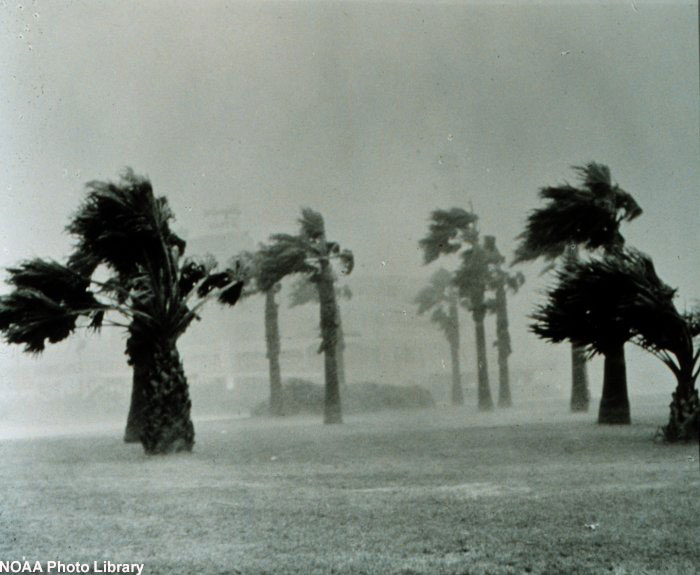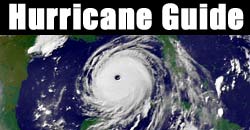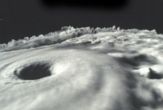Global Warming May Play Role in Hurricane Intensity

Climate change could make future hurricanes stronger, but whether the effect is measurable is still a matter of debate.? It is also unknown whether it will change the total number of storms.?
Kevin Trenberth from the National Center for Atmospheric Research (NCAR) claims that warmer oceans and increased moisture could intensify showers and thunderstorms that fuel hurricanes.
"Trends in human-influenced environmental changes are now evident in hurricane regions," Trenberth said. "These changes are expected to affect hurricane intensity and rainfall, but the effect on hurricane numbers remains unclear. The key scientific question is how hurricanes are changing."
Sea-surface temperatures in the tropical North Atlantic - the breeding ground for most U.S. hurricanes - have been the warmest on record over the last decade.? Across the globe, the amount of water vapor over the oceans has increased by about 2% since 1988.
Computer models show that these climate changes will push hurricane intensities toward extreme hurricanes, Trenberth said.? Moreover, the added moisture in the air will produce heavier rains and increased flooding when the hurricanes make landfall.
Swamped data
There is uncertainty, however, about how well the models account for all the inputs that might affect hurricane strength.
"In the models, an increase in sea surface temperature could make more intense systems," said Philip Klotzbach, who was not involved in the present work. "But the models do not account for changes in wind patterns that might tend to tear apart hurricanes."
Sign up for the Live Science daily newsletter now
Get the world’s most fascinating discoveries delivered straight to your inbox.
Klotzbach said that the effect of global warming on hurricanes may end up being small.? He said it is hard to notice any difference because the "signal gets swamped by year to year variability."
According to Chris Landsea of NOAA's Atlantic Oceanographic & Meteorological Laboratory, there is evidence for natural swings between high and low hurricane activity that extend for 25-40 years.?
"The last ten years have been busy for the U.S. - similar to what we experienced between the 1920s and 1960s," Landsea said.?
He thought that global warming could have an impact on hurricanes, but he quoted one study that predicted in 80 years only a five percent change in wind speeds due to increases in heat-trapping greenhouse gases.
"It doesn't mean there is zero effect," he said.? "But that's hardly measurable."
Storm tracks
Even with large swings in one region, the total number of big storms across the globe each year does not change by much.? Historically, when hurricane activity increased in the Atlantic, there was a corresponding decrease in typhoon activity in the Pacific, and vice versa, so the global hurricane frequency has remained steady over the years. ?
Klotzbach and William Gray, both of Colorado State University, have made hurricane forecasts for the Atlantic.? The current 2005 predictions are 15 named storms (up to the letter 'O'), of which eight are expected to become hurricanes.? Four may become major hurricanes.
Not all of these storms will reach land.? Predicting how storms will move is highly uncertain and may have little to do with global warming.
"There is no sound theoretical basis for drawing any conclusions about how anthropogenic climate change affects hurricane numbers or tracks, and thus how many hit land," Trenberth said
In 2004, four hurricanes struck Florida and 10 tropical cyclones or typhoons hit Japan.? These unprecedented numbers were at least partly due to large-scale circulation features that drove the events toward land.
The current work appears in the June 17 issue of Science.

The Names & Numbers Deadliest, costliest, busiest months, worst states, plus this year's storm names
How & Where Hurricanes Form The science of monster storms.
Storm Paths in 2004 Where the hurricanes hit.
Busy 2005 Season Predicted The official season forecast from the National Hurricane Center.
The Deadly 2004 Season Officials say lessons learned will save lives in the futur
Do you know who imaged it and where it was?
Rare One-Two Punch A pair of tropical storms are imaged at once.

Related Stories
Billion Dollar Weather Disasters Nature's Wrath: Global Deaths and Costs Swell Global Disaster Hotspots: Who Gets Pummeled










